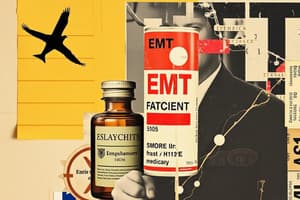Podcast
Questions and Answers
What is the recommended action after a patient inhales medication?
What is the recommended action after a patient inhales medication?
- Hold breath for 10 seconds
- Hold breath for 5 seconds (correct)
- Repeat the dose immediately
- Exhale slowly
What is a potential side effect of Naloxone?
What is a potential side effect of Naloxone?
- Respiratory depression
- Cardiac arrest
- Hypertension
- Nausea and vomiting (correct)
Why should nitroglycerin not be used?
Why should nitroglycerin not be used?
- In patients with a history of hypertension
- In patients taking sildenafil (Viagra) or similar medications (correct)
- In patients with a history of asthma
- In patients with a history of diabetes
What is the recommended dose of nitroglycerin?
What is the recommended dose of nitroglycerin?
Why should ALS be ensured to be en route?
Why should ALS be ensured to be en route?
What is the primary action of aspirin as an anti-inflammatory agent?
What is the primary action of aspirin as an anti-inflammatory agent?
Why should EMTs use caution when administering aspirin to patients taking anticoagulants?
Why should EMTs use caution when administering aspirin to patients taking anticoagulants?
What is the recommended dose of aspirin for chest pain of cardiac origin?
What is the recommended dose of aspirin for chest pain of cardiac origin?
What is the primary indication for administering epinephrine (EpiPen)?
What is the primary indication for administering epinephrine (EpiPen)?
What is the recommended dose of ipratropium for asthma or bronchospasm?
What is the recommended dose of ipratropium for asthma or bronchospasm?
What is a relative contraindication for administering aspirin?
What is a relative contraindication for administering aspirin?
Which medication is contraindicated in patients with hypersensitivity?
Which medication is contraindicated in patients with hypersensitivity?
What is the primary action of ipratropium?
What is the primary action of ipratropium?
What is the recommended route of administration for epinephrine?
What is the recommended route of administration for epinephrine?
Which of the following is a side effect of aspirin?
Which of the following is a side effect of aspirin?
What is the recommended dose of aspirin for adults?
What is the recommended dose of aspirin for adults?
What is the interaction of ipratropium with other medications?
What is the interaction of ipratropium with other medications?
Which medication is used to relieve mild pain and headache?
Which medication is used to relieve mild pain and headache?
What is the primary action of Naloxone?
What is the primary action of Naloxone?
What is a potential complication of opioid overdose treatment?
What is a potential complication of opioid overdose treatment?
What is the duration of action of Naloxone?
What is the duration of action of Naloxone?
What is a contraindication for the use of nitroglycerin?
What is a contraindication for the use of nitroglycerin?
What is the primary indication for administering Naloxone?
What is the primary indication for administering Naloxone?
What is the route of administration for Naloxone?
What is the route of administration for Naloxone?
What is the mechanism of action of nitroglycerin?
What is the mechanism of action of nitroglycerin?
What is the recommended action during administration of medication?
What is the recommended action during administration of medication?
Flashcards are hidden until you start studying
Study Notes
Recommended Action After Inhaling Medication
- After a patient inhales medication, ensure they hold their breath for a few seconds before exhaling slowly.
Potential Side Effect of Naloxone
- A potential side effect of Naloxone is withdrawal symptoms in opioid-dependent individuals.
Why Nitroglycerin Should Not Be Used
- Nitroglycerin should not be used if the patient has a systolic blood pressure below 90 mmHg, or if they are taking medications like erectile dysfunction drugs (e.g., sildenafil, tadalafil).
Recommended Dose of Nitroglycerin
- The recommended dose of nitroglycerin is one tablet or spray sublingually every 5 minutes, up to a maximum of three doses.
Why ALS Should Be Ensured to Be En Route
- Ensuring ALS is en route ensures the patient receives advanced medical care, including a more thorough assessment and potential interventions.
Primary Action of Aspirin as an Anti-inflammatory Agent
- Aspirin is an anti-inflammatory agent that inhibits the production of prostaglandins, which are involved in inflammation and pain.
Caution When Administering Aspirin to Patients Taking Anticoagulants
- EMTs should use caution when administering aspirin to patients taking anticoagulants because it can increase the risk of bleeding.
Recommended Dose of Aspirin for Chest Pain of Cardiac Origin
- The recommended dose of aspirin for chest pain of cardiac origin is 160-325 mg.
Primary Indication for Administering Epinephrine (EpiPen)
- The primary indication for administering epinephrine is anaphylaxis, a severe allergic reaction.
Recommended Dose of Ipratropium for Asthma or Bronchospasm
- The recommended dose of ipratropium for asthma or bronchospasm is two puffs as needed.
Relative Contraindication for Administering Aspirin
- A relative contraindication for administering aspirin is a history of gastrointestinal bleeding.
Medication Contraindicated in Patients with Hypersensitivity
- Medications contraindicated in patients with hypersensitivity to the drug include epinephrine, ipratropium, and naloxone.
Primary Action of Ipratropium
- Ipratropium is a bronchodilator that relaxes smooth muscles in the airways, making it easier to breathe.
Recommended Route of Administration for Epinephrine
- Epinephrine is administered by injection, usually into the thigh.
Side Effect of Aspirin
- A side effect of aspirin is stomach upset or bleeding.
Recommended Dose of Aspirin for Adults
- The recommended dose of aspirin for adults is 325-650 mg.
Interaction of Ipratropium with Other Medications
- Ipratropium has limited interactions with other medications.
Medication Used to Relieve Mild Pain and Headaches
- Aspirin is used to relieve mild pain and headaches.
Primary Action of Naloxone
- Naloxone is a medication that blocks the effects of opioids.
Potential Complication of Opioid Overdose Treatment
- A potential complication of opioid overdose treatment is withdrawal symptoms, which can be intense.
Duration of Action of Naloxone
- The duration of action of Naloxone is typically 30-90 minutes.
Contraindication for the Use of Nitroglycerin
- A contraindication for the use of nitroglycerin is a history of head trauma or recent stroke.
Primary Indication for Administering Naloxone
- The primary indication for administering Naloxone is opioid overdose.
Route of Administration for Naloxone
- The route of administration for Naloxone is intravenous, intranasal, or intramuscular.
Mechanism of Action of Nitroglycerin
- Nitroglycerin works by dilating blood vessels, which reduces the workload on the heart.
Recommended Action During Administration of Medication
- During administration of medication, monitor the patient carefully for any signs or symptoms of a reaction.
Studying That Suits You
Use AI to generate personalized quizzes and flashcards to suit your learning preferences.




